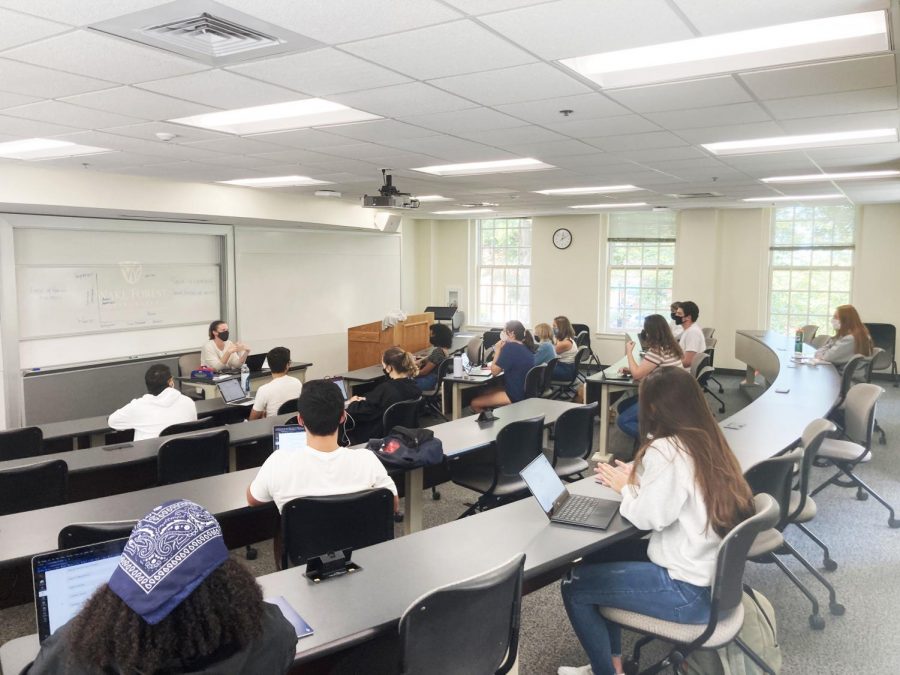Academic tips and tricks
While exploring Wake Forest, don’t forget to set yourself up for academic success
August 18, 2022
When entering your first year of college, you’ll probably spend most of your time worrying about the social scene: making friends, finding your people, getting invited to that cool party next Friday, etc. While making the most of your social opportunities is certainly important to having an unforgettable college experience, it’s equally important to focus on your academics and to make the most of the educational experience Wake Forest has to offer. Here are a few of the most essential academic tips & tricks that, in my experience, will help you conquer classes.
1. Go to class.
Seems pretty self explanatory, right? You may have had perfect attendance in high school, but in college, attendance culture drastically changes. Even though some professors do take attendance, some students view class as optional and instead just get notes from their friends to go over what they missed.
Bigger lectures with no attendance seem almost too easy to skip, since no one is holding you accountable. The bottom line is… go to class. Don’t skip unless you’re actually sick and unable to go. Once you skip once or twice, it’ll become a habit, and you’ll certainly fall behind.
Catching up solely based on your classmates’ notes isn’t enough to stay up to date with the class content, and come exam time, you’ll realize your mistake. Plus, class can actually be fun and engaging in person, and it’s a great way to make friends. Why miss out on something that’s imperative to your academic success and can bring you a few friends along the way?
2. Form relationships with your professors.
While getting good grades in a class is important, it’s equally as important to form a mutual relationship with your professors.
It’s easy to go through an entire semester without ever connecting with your professors — you do the work, turn it in, and move on. However, creating bonds with your professors will not only help you succeed in a class, it builds an important network that will be extremely beneficial come time for recommendation letters, research opportunities, etc.
Professors want to help their students, and forming these mentor/mentee relationships can help you thrive both academically and professionally. The best way to start forming these connections is to attend office hours and reach out to your professors outside of class for extra help or even a cup of coffee.
3. Find what studying strategies work best for you.
Instead of telling you to plan out your studying over the course of a week, or to cram it all the night before, my biggest advice for studying is to find what works best for you.
We all process information in different ways, so even though your friend might be able to get an A after reading the textbook once the night before an exam, that might not be the best strategy for you.
Take the first few weeks of class to discover your best studying style — if you don’t already know it — and apply that strategy to your future exams. I can’t tell you how to study, but I can tell you that knowing how YOU study best will set you up for success in future exams.
4. Participate.
Again, this one seems pretty self explanatory. In most classes, participation is actually worth part of your grade, the percentage depending on how much of a seminar/speaking style class it is.
Regardless of how much participation is worth, my recommendation is to try and participate at least once in every class. This way, your professor will recognize that you do the readings and genuinely care about the subject, and it can also stimulate engaging debates between you and your classmates.
Speaking up in front of people you don’t know can be scary, but it’s likely that everyone else is scared to raise their hand as well. There is no such thing as a bad question, so speak up and share your thoughts. It’s worth it for both the academic and mental rewards.
5. Don’t be afraid to ask for help.
Homework, quizzes, projects, and exams can all be daunting. Especially when your first major college assignment rolls around. It’s okay to not have everything figured out and to not know exactly what to do.
Asking for help, from either friends, classmates, professors, or tutors at one of the academic centers, is not a sign of weakness, rather, it is a sign of integrity and intelligence. Wake Forest offers several academic help services, such as the Writing Center, the Math and Stats Center, the Office of Academic Advising, and individual tutoring.
It’s also always smart to ask the professor who assigned the work any clarifying questions that others may not know the answer to. Everyone needs help at some point, so don’t let insecurity stand in the way of your success.















